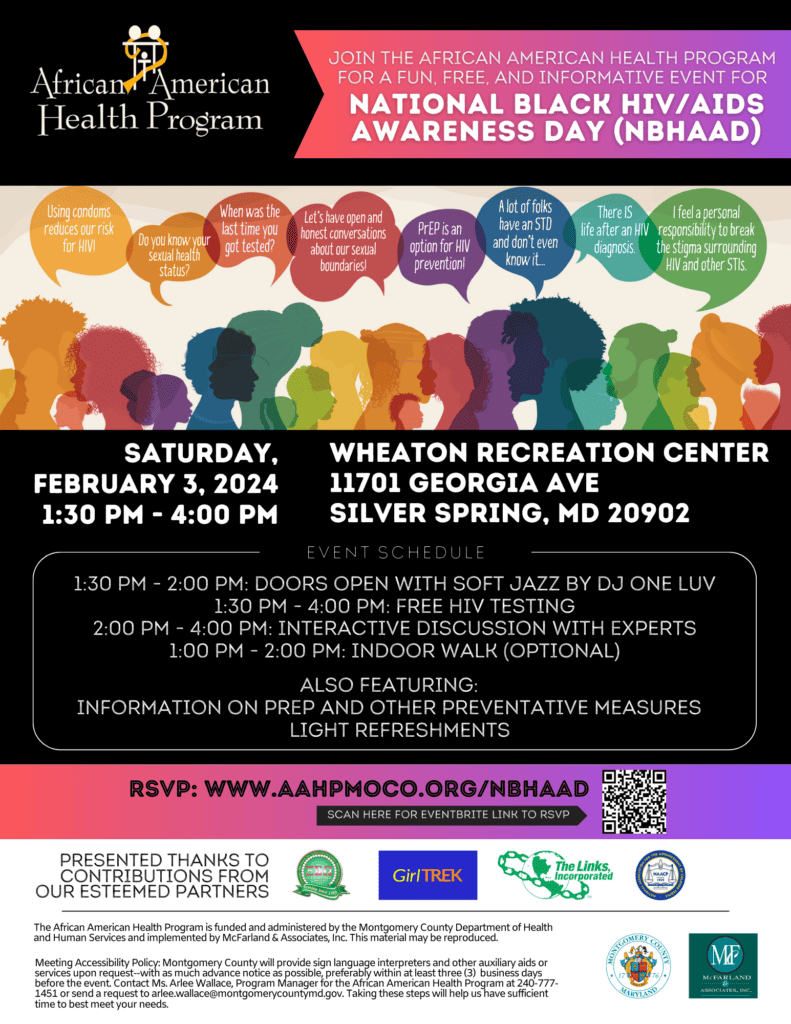The Montgomery County Commission on Aging is hosting a series of informative sessions aimed at enhancing the lives of older adults. Led by volunteers from the Commission's Ambassador Program, these sessions provide a comprehensive overview of the various community resources available to senior residents of Montgomery County to ensure that they have all the necessary tools and information to lead comfortable and active lives.
Among the topics to be covered are volunteer opportunities that encourage community involvement, the ARC Respite Coordination Program which offers significant respite care hours at no cost, and how to obtain free, durable medical equipment like walkers and wheelchairs. Additionally, the sessions will discuss life transition programs and free transportation services specifically designed for residents aged 60 and older. The sessions are scheduled across multiple venues and dates, including the White Oak Senior Center, East County Community Center, Leisure World, White Oak Library, and the Courts of Clarksburg.
For further details or to inquire about specific events, interested individuals can contact the Aging and Disability Resource Unit at 240-777-3000.
April is National Minority Health Month!
This annual observance builds awareness about the health disparities that persist among racial and ethnic minority and American Indian/Alaska Native (AI/AN) populations and encourages us to take action to end these inequities.
Each year, the U.S. Department of Health and Human Services (HHS) Office of Minority Health (OMH) designates a theme for National Minority Health Month. The theme for 2024, Be the Source for Better Health: Improving Health Outcomes Through Our Cultures, Communities, and Connections, is about understanding how the unique environments, cultures, histories, and circumstances (known as social determinants of health, or SDOH) of racial and ethnic minority and AI/AN populations impact their overall health.
Non-medical factors like poverty, limited access to health care, lack of education, and racism are all examples of SDOH that contribute to health disparities and inequities. SDOH impact nearly everyone in one way or another, and simply promoting healthy choices won’t eliminate health disparities. Considering the conditions in the environments where people are born, live, learn, work, play, worship, and age is fundamental to improving health and reducing longstanding disparities affecting racial and ethnic minority and AI/AN populations.
Visit the National Minority Health Month 2024 website to find resources, social media messages, graphics, and information on how to Be the Source for Better Health.
This April, the Brother 2 Brother (B2B) initiative is excited to offer two engaging events designed to empower and promote the health and well-being of Black men in Montgomery County. These events are tailored specifically to address the health gaps affecting Black men and provide valuable knowledge and support to improve their overall health.
On April 18th, the B2B Upper County event at the Germantown Park Community Center will highlight the importance of physical movement and how it contributes to overall health. Attendees can look forward to demonstrations of basic physical movements, stretches, and crucial pre- and post-workout drills. The event will also include a group discussion on the mental and physical benefits of exercise. The event will be hosted by Ramont Prather and will feature Tungi Kelley, a leader in Gaithersburg's fitness community, who will share insights on maintaining a healthy mindset and the importance of physical fitness in one's overall well-being.
AAHP’s Downtown Brother 2 Brother event at the Wheaton Community Center will focus on cancer prevention, management, and survival. With Jamal "DJ One Luv" Muhammad as host and Dr. Clinton Burnside from Howard University Cancer Center as a special guest, the event will highlight the latest in cancer research, prevention strategies, and management techniques.
By attending, Black men in Montgomery County will gain knowledge on how to prevent chronic diseases, promote their own health and wellness, and engage in valuable discussions on health habits and actions for a healthier lifestyle. RSVP here: www.surveymonkey.com/r/b2bregister
Download the flyer for the April 18 Brother 2 Brother event (below) here.

Download the flyer for the April 18 Brother 2 Brother event (below) here.

AAHP proudly announces the launch of its comprehensive Alzheimer’s Awareness Toolkit, designed to enlighten, educate, and empower our senior community, as well as their caregivers, on the nuances of Alzheimer’s disease and dementia.
Alzheimer’s disease is not just a condition of memory loss; it’s a debilitating ailment that impacts millions of lives, especially within the Black/African American community, which faces a higher incidence rate compared to others. The AAHP Alzheimer’s Awareness Toolkit serves as a crucial resource in demystifying the disease, offering a wealth of information from understanding the early signs and symptoms to managing the progressive stages of Alzheimer's.
View/Download AAHP’s Alzheimer’s Awareness Toolkit here.

The rate of colorectal cancer is rising among young adults, and because it’s Colorectal Cancer Awareness Month, let’s talk about it! While the rates for many cancers are on the decline, the rate of colorectal cancer has increased by 2% per year for people under the age of 50 in the past 20 years. While experts aren’t sure why so many more young people get colorectal cancer, they suspect changing dietary habits, reduced exercise levels, and the rise in obesity contribute to this troubling trend. Given these circumstances, it’s critical for younger adults to understand colon cancer prevention and the importance of early detection.
The increasing rate of colorectal cancer among younger adults has prompted health experts to now recommend colorectal cancer screenings (colonoscopies) to start at age 45 for individuals with an average risk profile, decreasing from the former benchmark of age 50. In addition to screening, taking preventive measures is also important. These steps include embracing a diet abundant in fruits, vegetables, and whole grains; maintaining a healthy weight; staying active; and steering clear of smoking and excessive drinking. Young people should also know and look out for colorectal cancer symptoms, like rectal bleeding, unexplained weight loss, and ongoing changes in bowel habits. If you are experiencing these symptoms, please don’t brush it off or procrastinate. See your doctor ASAP because early detection can be lifesaving.
Learn about cancer prevention by joining AAHP’s Cancer Education chat on Fridays at 1:30pm. Register/join here: www.aahpmoco.org/canceredu
AAHP and its community partners invite all Montgomery County friends, families, and neighbors to join us for the 10th Annual AAHP Community Day! This milestone celebration will take place on Saturday, April 6, 2024, from 9:30 am to 2 pm at the Montgomery College Germantown campus. AAHP Community Day 2024 is free and open to the public. Mark your calendars, and register here.
AAHP Community Day 2024 will kick off at 8:00 am with our invigorating walk/run/bike event. In line with the 2024 theme, “Celebrating Our Thriving Community and Your Health,” AAHP Community Day 2024 will also feature an interactive discussion on security, change, and wellness with youth, families, and the community. Participants will enjoy an exciting array of activities, including interactive workshops, dynamic demonstrations, and community exercise sessions that will include heart-pumping Zumba and lively line dancing.
Don’t miss your opportunity to fellowship with your community and celebrate health at this very special 10th Annual AAHP Community Day 2024. Space is limited so register early here.
View/download the flyer here.
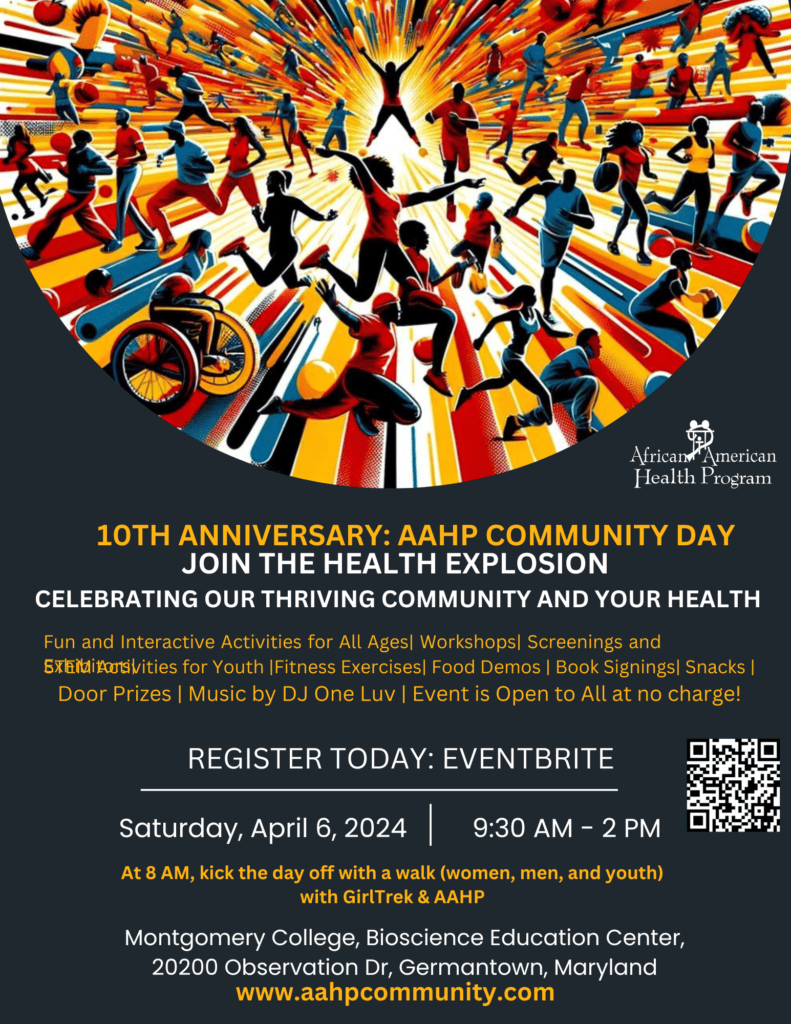
The African American Health Program is excited to present the Brother 2 Brother (B2B) Initiative, a series of talks hosted by Jamal "DJ One Luv" Muhammad, a multi-talented DJ, promoter, talk show host, and visual artist. An initiative focused on improving the health and wellness of Black men in Montgomery County, B2B provides monthly group discussions aimed at Black men to help them understand their health better. These meetings aren't just talks; they're steps toward empowerment. By educating participants on how they can prevent chronic diseases and promote their own health and wellness, the B2B Initiative will address the significant health gaps affecting Black men. The program offers sessions in two locations each month, one uptown and one downtown, on two different dates, making it accessible to more people.
Why focus on Black men? Because Black men have the lowest life expectancy and face more health issues compared to other demographics. Sadly, their health has often been overlooked by society and sometimes by Black men as well. B2B's goal is to change this by giving Black men the knowledge and support they need to improve their health.
AAHP's Brother 2 Brother talks will feature guest speakers such as Dr. Jason Joubert, who has dedicated his life to promoting health and fitness. Dr. Joubert began his career as a personal trainer and went on to specialize in rehabilitation, earned his Doctorate in Physical Therapy from Howard University in 2019. He combines his extensive knowledge and passion to deliver personalized care, focusing on pain management, functional restoration, and preventive health strategies for his patients.
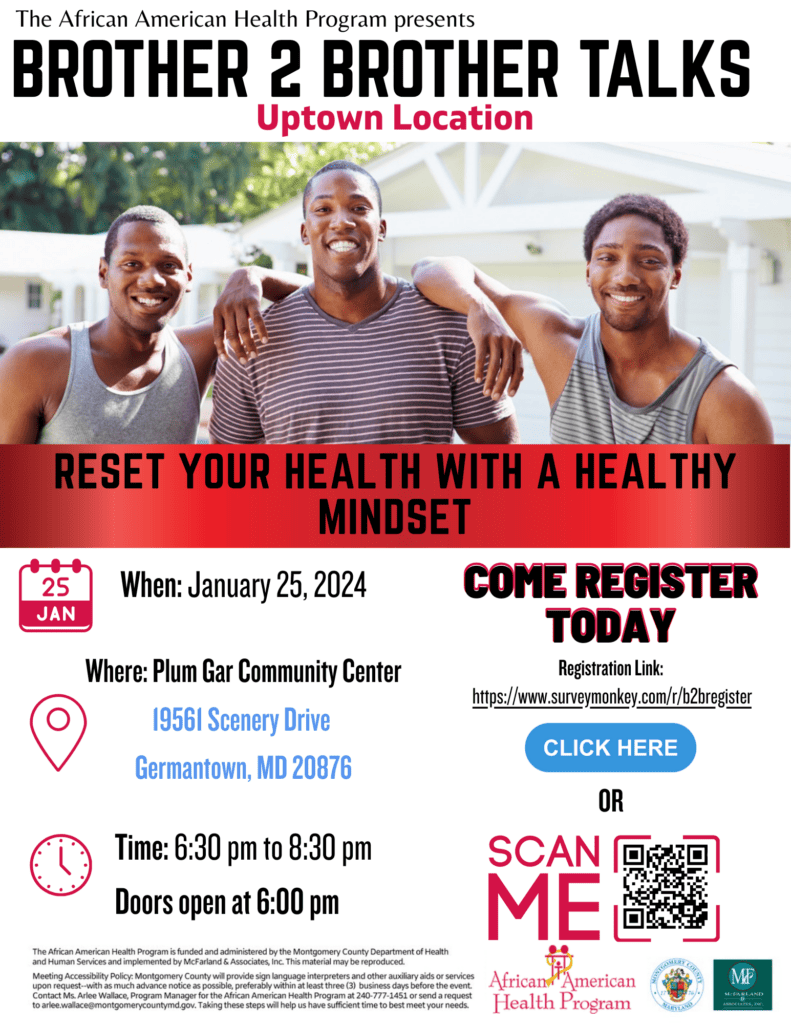
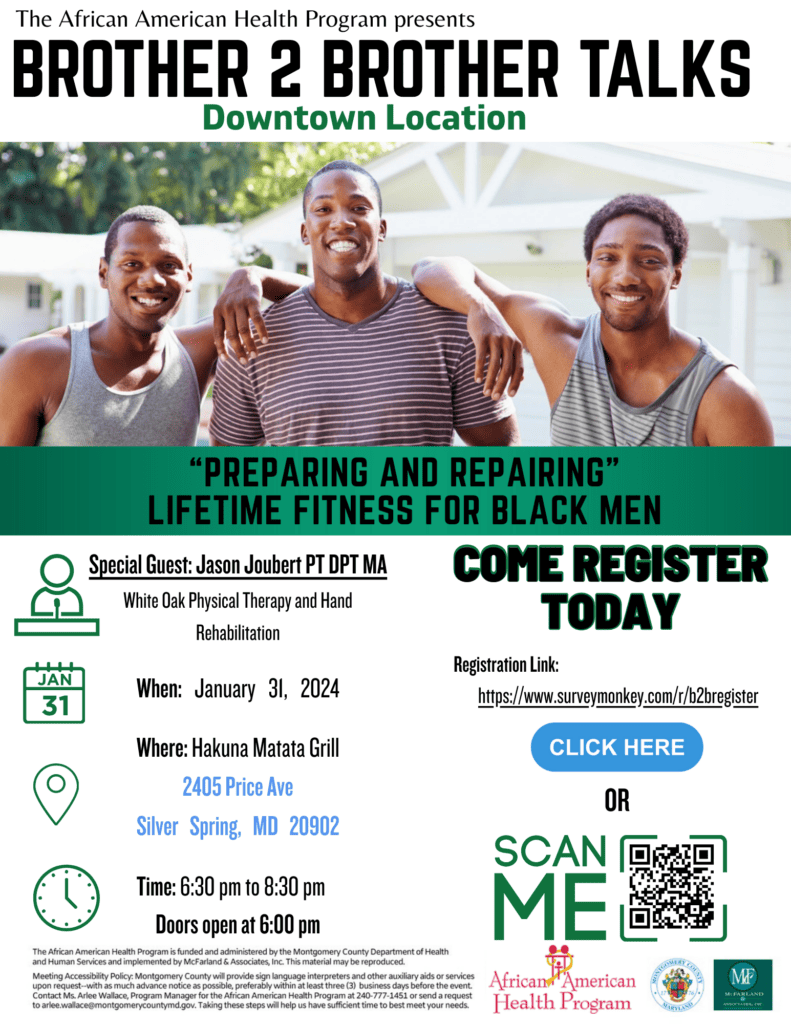
During Black History Month, while we celebrate the strength and successes of the Black/African American community, we also reflect on our ongoing challenges and the progress being made, particularly in three critical health areas: maternal health, cancer, and mental health.
Recently, there's been increased attention on the significant health disparity showing that Black/African American mothers are three times more likely to experience pregnancy-related death compared to White American mothers. But there's good news ahead. Last year, the Biden-Harris Administration promised over $103 million to address the maternal health crisis. Recognizing that the lack of access to job-protected paid parental leave has a negative impact on maternal health outcomes, Maryland has passed laws to make parental paid leave mandatory. Additionally, the Maryland Department of Health has expanded Medicaid coverage for pregnant beneficiaries, extending the period that new mothers can receive postpartum care services from 60 days to 12 months. These initiatives give us hope for better health outcomes for Black/African American mothers and their families.
From 1999 to 2019, cancer death rates among Blacks/African Americans have decreased, particularly in lung and stomach cancers, thanks to increased awareness, screening, and treatment options. However, statistics show that Blacks/African Americans still face a higher risk of dying from cancer within five years of diagnosis and more often detect serious cancers too late, when treatment is less effective. Despite these challenges, the gap in cancer outcomes is closing, and with efforts to promote participation of Blacks/African Americans in cancer treatment clinical trials, this trend is likely to continue.
The mental health landscape for African Americans is complex. In 2020, suicide was the third-leading cause of death among Blacks/African Americans aged 15 to 24. Despite an overall suicide rate that was lower than that of White Americans, the rate of suicide attempts among Black/African American females in high school was 60% higher than that of their White counterparts in 2019. Furthermore, while 21% of Blacks/African Americans reported having a mental illness in the 2021 National Survey on Drug Use and Health, only 39% received mental health services, compared to 52% of White Americans. Growing awareness about mental health and public campaigns to de-stigmatize mental illness bring hope that more Blacks/African Americans will get the support they need. If you think you may need mental health support, AAHP’s online mental health assessment tool can provide resources to point you in the right direction. Take a mental health screening test here.
As we celebrate the achievements and resilience of the Black/African American community during Black History Month, let’s remember to keep health at the forefront of the journey toward equity and prosperity.
Sources:
AAHP Aging subcommittee post will begin hosting monthly events to discuss memory health issues in collaboration with local Black Churches. These activities will culminate in an Alzheimer’s event, “Memory Sunday,” which will take place on the 2nd Sunday in June.
Memory Sunday is based on guidelines established by The Balm in Gilead’s Brain Health Center for African Americans (BHCAA), a respected organization dedicated to improving the health and wellness of Black communities. BHCAA incorporates the influence of African American churches to deliver educational information about ways to reduce the risk of developing dementia and provide support to people living with Alzheimer’s and their caregivers.
For more information: contact Ama Lee, Aging Ambassador for the AAHP Aging Subcommittee, at ama.lee@montgomerycountymd.gov or 240-777-1833.
View/download the flyer here.
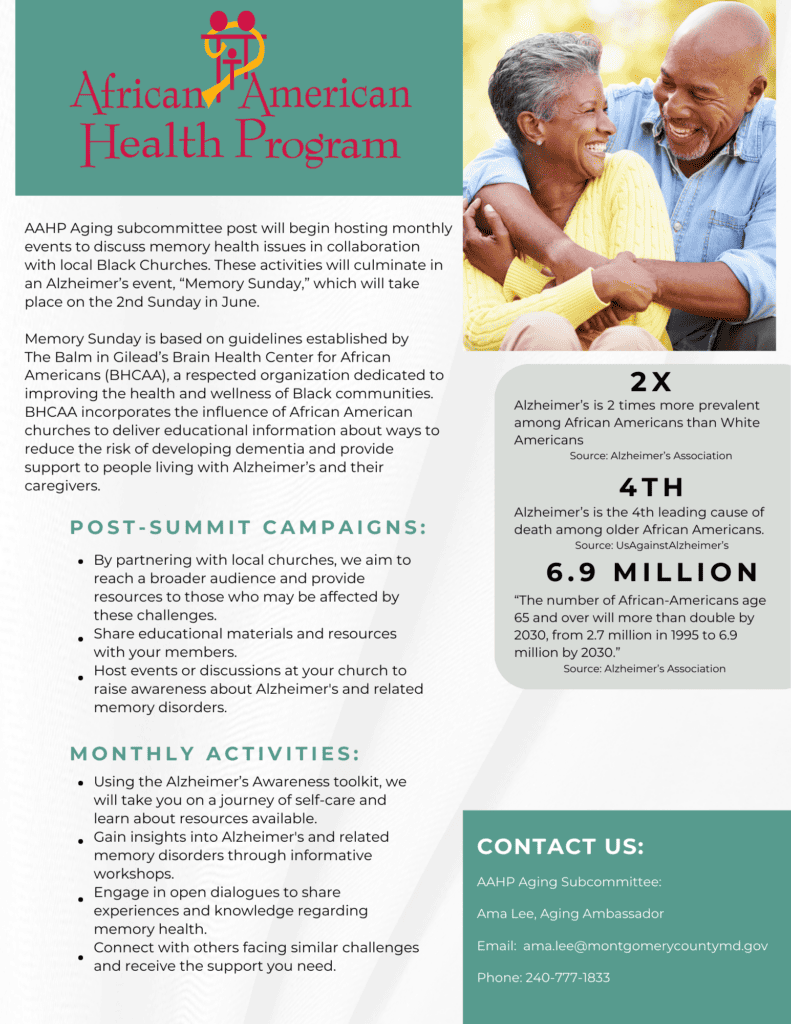
Join AAHP at the Wheaton Recreation Center in Silver Spring, MD on Saturday, February 3 at 1:30pm as we commemorate National Black HIV/AIDS Awareness Day. This exciting in-person event is dedicated to elevating consciousness about HIV/AIDS in the Black community, offering a wealth of information on prevention, testing, and treatment. Experience a dynamic program filled with captivating workshops, empowering speeches, and interactive activities designed to enlighten and inspire. Connect with a network of healthcare experts, community advocates, and like-minded individuals all united in the mission to dismantle stigma, enhance awareness, and uplift those impacted by HIV/AIDS. Don't miss this opportunity to be part of a movement that champions health and solidarity! For more information and to register, visit www.aahpmoco.org/nbhaad
Download this flyer here.
